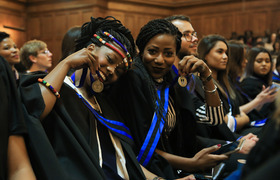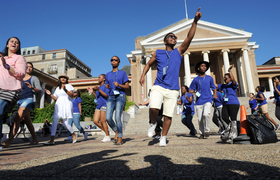Is our freedom shrinking?
22 September 2014!["I would propose that for every academic book, they [academics] publish a piece in a mainstream newspaper or magazine, or [give] an interview on radio or television." - Max du Preez in his TB Davie Memorial Lecture. Photo by Michael Hammond.](/cache/images/archive/emp/2014/vol33_08/800x0/normal/uct_1994.jpg)
Twenty years after democracy, there are alarming signs that our freedom is shrinking, a situation that must be reversed before South Africa "lands on the slippery slope to authoritarianism", said veteran journalist Max du Preez.
Du Preez was delivering the 49th TB Davie Memorial Lecture in the Jameson Hall on 28 August, some 22 years after UCT awarded him an honorary Master of Social Science degree.
"Right now we need more freedom, more openness, more academic freedom and more tolerance," said the author and activist, of what he sees as the steady corrosion of the country's democratic values.
But the core of his lecture, titled The Mediocrity of Intellectual Discourse: Misrepresenting South Africa in the academy and beyond, was a call to academia.
In the transition to democracy, the role of the public intellectual has dissipated, impoverishing public discourse - and our understanding of society, he said. As such, academics had neglected that "other leg" of academic freedom and responsibility.
Step up to the plate
"We need academics to step off campus much more often to fill the gaps left by the media, the political establishment and the faith communities," Du Preez said. "There is no way universities in South Africa can go about their business without focusing their minds on the specific demands and needs of our society."
Many young academics prefer the sanctuary of the institution and their research, he added, believing it is "too risky, too traumatic to get caught up in the rough and tumble" of political and social discourse in South Africa.
"And this can be problematic; public discourse is so poor at the moment that we often don't go beyond labels."
Du Preez said that UCT law academic and Constitution expert Professor Pierre de Vos is an example of how academic engagement had strengthened public discourse, through the media.
Another example is the Oscar Pistorius trial, for which law professors, lecturers and senior counsel went to "epic" lengths to explain what was happening in court and what it meant.
"Thanks to them, millions of people following the trial on television or radio know a lot more about the legal system and the courts' functioning."
A third example was the Marikana shooting
"We all saw the TV footage and heard statements from the police, mine managers and trade unions. And then an academic from the University of Johannesburg took his team to Marikana and pieced together what really happened. It was a very different story from what the police and the mine management had told us. That was proper public engagement."
The same could be done for education, social, health, and economic issues, creating a better-informed public.
"If you don't live up to your responsibility, you run the risk of forfeiting some of your freedom ... society demands that universities produce public intellectuals who participate actively and visibly in public life."
Openness might not last
While democracy has provided free speech, the Constitution, and the public protector, there is currently a "disconnect" between these functions and the reality on the ground - warning signs that "this openness might not last", Du Preez cautioned.
This has been reflected in attacks against artists and the press, the "brutal control" of the public broadcaster, "blatant manipulation" of the criminal justice system, and police brutality.
"The war of words between the ANC and the EFF [in Parliament] is a reminder of that. We have the bizarre situation that the once-powerful liberation movement, with about 62% of the vote in the election, threatened strong-arm tactics - even riot police - inside our highest legislative body, after a simple verbal [EFF] interjection in Parliament.
"And we have the leader of a new party, after contesting a free and fair election in May, threatening to form a military wing and go underground. We seem to have forgotten about the 10 000 people who died in the conflict leading up to 1994. "What we need is a greater stimulation of ... thinking and a decent exchange of ideas across the different sectors of society. As a society, we have not rid ourselves of the fears and prejudices and that lack of knowledge of 'the other'."
Who will carry the baton?
With the exception of talk radio, the mainstream media have failed this challenge, Du Preez said.
"The public broadcaster could have and should have played a leading role in forming and stimulating public opinion, but it has become a tragicomedy ... Our investigative reporting is still good, but now seldom goes beyond unearthing scandal and corruption."
The country's highly regarded academics must step into the breach.
"Enter the public intellectual, that animal trained and equipped to think, to expand knowledge and national conversations ... to bring new insights to controversies. But where are our young bright sparks who can take the baton from Njabulo Ndebele and Frederik van Zyl Slabbert? Why could we never produce another Steve Biko?"
The black intellectual
Part of that answer lies in the country's poor education legacy, said Du Preez, who in addition to his writing is also a senior research fellow at the University of Fort Hare, a former incubator of African leaders.
"Why hasn't Fort Hare become a jewel in the crown of the liberated country? What does it say about us that Fort Hare, Venda and Transkei universities are not listed in the country's top 10 universities? What does it say about us as a society that we knowingly perpetuate inequality by providing excellent schools for the white and black middle-class kids, but totally neglect education in townships?
"Too often when we think we are talking about the public intellectual, we only talk about politics. I've been heartened by the courage of a few black journalists - who initially had to fight for their space, because white intellectuals had been dominating it for so long.
"I have a lot of sympathy for young black academics asserting themselves and sometimes feeling the pangs of insecurity. Arrogance, smugness and ignorance can be an extremely alienating environment.
"They now have that space, that foothold, and will hopefully grow in confidence ... society desperately needs their voices." Du Preez ended with a challenge: "I urge you and the students at this university: for the sake of our freedom, fight the good fight for an open society and a deepening of our democracy."
The TB Davie Memorial Lecture is held in honour of Thomas Benjamin Davie, UCT vice-chancellor from 1948 to 1955. Davie was a fearless defender of the principles of academic freedom and university autonomy. He defined academic freedom as the university's right to determine who shall be taught, who shall teach, what shall be taught and how it should be taught, without regard to any criterion except academic merit.
Story by Helen Swingler.
 This work is licensed under a Creative Commons Attribution-NoDerivatives 4.0 International License.
This work is licensed under a Creative Commons Attribution-NoDerivatives 4.0 International License.
Please view the republishing articles page for more information.










